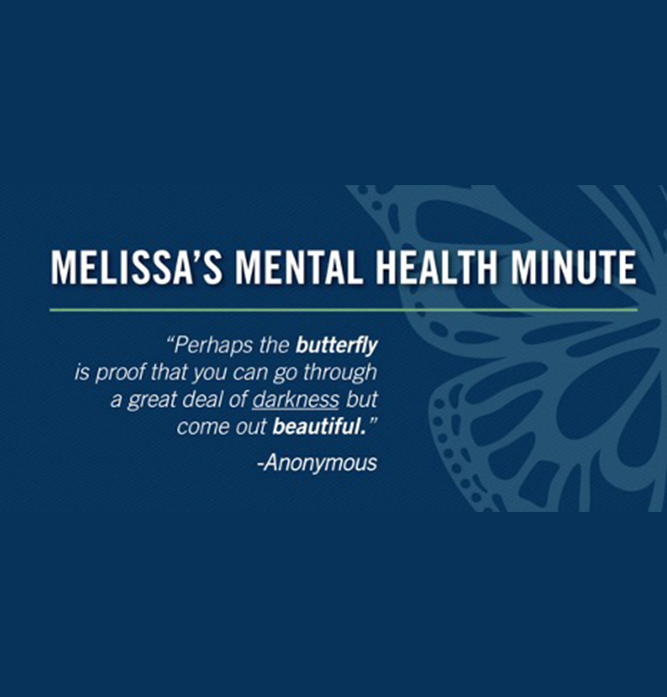“Melissa’s Mental Health Minute” Videos Still Making the Rounds, Even After COVID Lockdown
By Alondra DeLeon Guimaraes | Observer Contributor

Destressing can be quite challenging sometimes. Sometimes it’s viewed as an inconvenience, another chore to add to the to do list, or it can feel too time consuming. This perspective is often observed among the students and faculty at Mount Wachusett Community College, but it’s actually easier than one would think. The Mount’s mental health counselor, Melissa Manzi, partnered with the Dean of Students, Jason Zelesky, and the marketing department to launch a vlog series on YouTube called Melissa’s Mental Health Minute for this very reason during the pandemic. “Our challenge was to find ways to connect to our students,” Dean Zelesky explained. “Having the remote infrastructure was not easy for our students especially during the COVID-19 shutdown.”
“The series was actually made during the COVID-19 lockdown two years ago,” Manzi explained. “The students already know these topics, so it was just something to put back into mind again.” In the videos, the counselor explores and explains topics such as anxiety, depression, time management, sleep, and others– all in under or a little over a minute! These videos were uploaded to YouTube per the marketing department and sent out by Student Services once a week, which was part of Zelesky’s role in the series.
“Promoting services is critical. Also, we are working with marketing to find ways to get information and resources out to students.” Zelesky said. The director of marketing and communications, Stephanie England, shared how they support all student services in whatever ideas they have in mind. “Our strategy is to use social media platforms as those have the highest current student following along with our digital signage embedded throughout all campuses.” England explained. “The more support we can give to our students in a holistic way, the more likely it will reach a student in need.”
“It was fun and hard to do for many reasons,” Manzi admitted when asked about the series. “One of them was that the videos had to be short and catchy so the students could help market this resource.”
Making an impact in such a short time wasn’t an easy task for the counselor. She found herself questioning, “How can I share something impactful in so little time?” Being in the middle of a lockdown, Manzi had to film the videos in the comfort of her own home. She had to shift her focus to what was in her control. Additionally, the series faced the difficulty of coordinating communication via email and the risk of losing out on engagement as a result. “Not many students or faculty know about this resource because they receive so many emails which means it was often overlooked,” the counselor stated.
An example of this is Elys Alder, a professional writing major at The Mount who heard about the series from a fellow classmate. “I had extra time to watch these videos during my lunch break at work and was meaning to watch them sooner.” Alder explained. “They were so quick and accessible to watch on YouTube.”
The most difficult part of this entire series– the response. “That is the hardest part. You don’t know the results. In a clinical perspective, one would never know if the intervention helped. One just looks for any help they can get,” Manzi elaborated.
Similarly, Dean Zelesky mentioned the like/dislike, and comment feature on the social media site; when looking for feedback, not much was found on YouTube. But a different response was found outside the website. “Students may have not watched the video; however, they did access counselor Manzi’s contact information to connect which was displayed in the video and with it. She was very busy during the pandemic and still is,” the Dean recalled.
“Melissa Manzi truly cares about the messages she’s transmitting through the videos. It’s also apparent that she wants them to reach as many people as possible,” Alder enthused. “These videos served as a supplemental reminder for the things that I already heard in my own therapy sessions previously.” They also emphasized that they would gladly recommend these videos to anyone. “Anything that promotes safe and positive mental health practices and fosters mental well-being is helpful to anyone it applies to.”
Unfortunately, the last video of Melissa’s Mental Health Minute was posted in 2020. When asked if any more videos were in the works, Manzi made an exciting announcement, stating, “The Dean of Students and I are talking about making a potential podcast in the future because many are not aware of the counseling services on campus.”
Zelesky explained further, “It will be short and include guest speakers such as our students here at the college. We plan to touch on topics similar to what we said in the videos.” The dean also indicated that the podcast would comparable to an autonomous sensory meridian response— more commonly known as ‘ASMR’— podcast. While students and faculty may have to wait for that podcast, here’s a word of Melissa’s Mental Health Minute advice: “Get Sleep! It is essential!” She emphasized. “Everything else will come on its own. Also try to get a short period of uninterrupted sleep. It is better than eight hours of interrupted sleep patterns. Any small changes tend to work as well.”
Comments are closed.